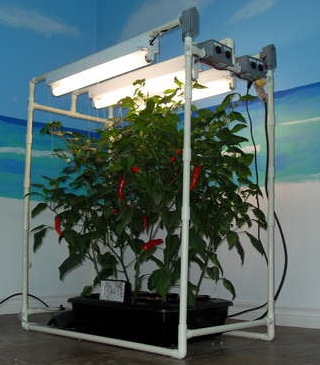Hydroponics is a method of growing vegetation without soil, oftentimes indoors or in a greenhouse. The environmental growing conditions are tightly controlled, which enables plants to survive in locales and during times of the year when they would otherwise not be able to. Hydroponic systems range from basic, homemade designs to expensive and automated manufactured kits.
Powerful artificial lighting sources shine on the plants and mimic the sun. Lights with varying color temperatures are used at different points in a plant’s lifecycle, as needed, for maximum growth. Some contained-greenhouse hydroponic systems use a carbon-dioxide generator to augment plant growth. All environmental factors are closely monitored, including pH, temperature, and humidity levels.
There are two basic versions of hydroponic growing systems:

- Solution culture grows vegetation without any growing medium, such that plants’ roots are fed directly by a liquid-nutrient solution. The plant may sit directly in a large bucket of nutrient-rich water, for example. Aeroponics is a subset of solution culture, in which plants grow while suspended in a chamber of air. Misters spray roots with water and nutrients at regular intervals.
-
Medium culture also feeds plants by means of a liquid-nutrient solution, but additionally uses an inert physical medium (such as gravel, perlite, mineral wool, expanded clay, sand or coir) to hold the roots in place. The “ebb-and-flow” method is a popular form of medium culture. In this system, plant roots are saturated and subsequently drained of nutrients and fluids at regular intervals.
Advantages of Hydroponic Systems
- Hydroponic techniques can be used in areas of the world where there is insufficient or infertile soil.
- Hydroponic systems can be used all year ’round. Plants may be grown out of season and outside of the region they naturally grow in.
- Hydroponic systems use significantly less water than conventional ones, especially when water is recycled and recirculated through the system. This results in a lower water bill.
- Many growers report increased yields using hydroponic techniques.
- All environmental growing factors may be precisely controlled in a hydroponic system.
- When grown hydroponically, plants are sheltered from outdoor pollutants.
- Using non-soil growing systems reduces the need for many hazardous pesticides that tend to accumulate and remain in the soil.
- Nutrients may be recycled throughout the system.
Disadvantages of Hydroponic Systems
- Complete hydroponic systems require a high initial financial investment.
- Systems must be continually monitored and maintained, and refilling supplies may become prohibitively expensive long-term.
- Retailers of manufactured hydroponic systems may inflate claims about their products.
- Vegetation growth may be stunted because of insufficient light or carbon dioxide levels.
- Intense artificial lighting sources may cause a significant increase in electricity consumption and power bills.
- Maintaining a properly functioning hydroponic system requires substantial time, dedication and know-how. There are many precise factors that must be accounted for, and inexperienced users may be likely to fail in producing healthy crops.
- Ebb-and-flow systems are prone to a buildup of salts that inhibit the ability of the plants to take in nutrients.
- Hydroponic systems are susceptible to harmful bacteria, mold growth and odor.
- There is no guarantee that hydroponically grown produce is as healthy as their conventionally grown counterparts.
Hazards of Hydroponic Systems
- Hydroponic systems can pose a serious fire hazard, especially when grow lights are used improperly, electrical connections are frayed, ventilation is lacking, or flammable materials are in the vicinity.
- Damaged metal halide lights may cause serious skin damage.
- Hydroponic systems are prone to electrical hazards, especially when there is exposed wiring that could come into contact with water.
- High-intensity discharge (HID) lights pose a risk of explosion, especially when exposed to water.
- High levels of CO2 from CO2 generators can be toxic to vegetation and to people. Improperly burned fuel in carbon-dioxide generators can produce carbon monoxide.
- Tangled electrical cords, or extension cords strung on the floor, may pose a tripping hazard.
Inspection of Hydroponic Systems
- A certified electrician should supervise all electrical wiring work.
- All electrical cords should be neatly organized and connections should be in good working order, with no exposed wiring.
- Grow lights should be shut off for at least six hours each day.
- Growing containers should be free of leaks.
- Growing areas should be cleaned frequently and always kept free of pests.
- Humidity levels should be closely monitored and controlled so as to avoid a buildup of potentially problematic moisture.
- Flammable items should be placed far from the hydroponic system, as such items pose a fire hazard when grow lights are powered on.
- HID lights should have ample clearance so that they are allowed to properly cool when turned off.
- HID bulbs should be kept free of fingerprints and moisture, and should not be turned on when they are cold.
- Metal halide lights should have protective coverings that minimize hazardous UVB rays from leaking out.
- Ballasts and HID lights should be placed in a position where they cannot be accidentally knocked over.
- The growing area should be well-ventilated with oscillating fans.
- Electrical circuits and receptacles should never be overloaded.
- Electrical cords should be properly matched to the receptacle; grounding wires should not be cut off of cords to use in non-grounding receptacles.
In summary, hydroponic systems are becoming increasingly popular in many regions for growing certain crops all year long. But they can pose serious hazards if they are not properly implemented and maintained.
